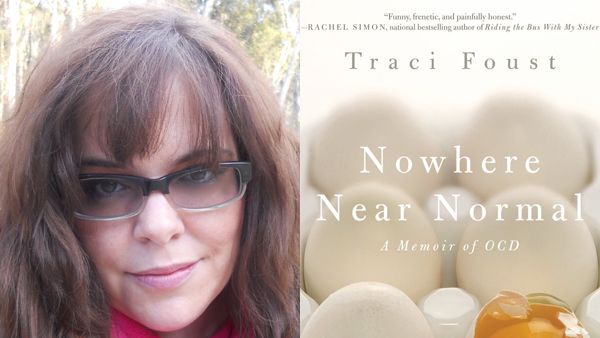What We're Reading: A Memoir That's Nowhere Near Normal
Ever been obsessed with something? Read about a woman who can't control her obsessions.

While most seven-year-olds find themselves caught up in the latest pre-teen pop sensations or busy with cartoons and hopscotch, Traci Foust couldn't escape her fascination with obsession. In a memoir titled Nowhere Near Normal, the author shares her lifelong struggle with obsessive-compulsive disorder in a way that's both witty and heart-wrenching. Whether it was the repeated ritual of unplugging lamps or habitually snapping her fingers, Foust's happiness seemed to hinge on the correct placement of the shampoo bottles lined neatly on her shower stall.
We spoke with Foust about her battle with anxiety and her advice to those who share her obsessive habits.
What obstacles did you encounter while chronicling your journey?
I hate to use the word obstacle because it's all a learning process. It was very therapeutic to write a memoir like this. My only difficulty was to fully remember what my mindset was like during the really high anxiety times. I had to put myself in that mindset to write in the voice of a seven-year-old and then get a little more mature as the book goes along. My agent wanted me to reveal everything to find the story underneath all of the little jokes. And I truly believe the more you reveal the more you help others and yourself as well.
How have you grown to handle your OCD and its symptoms as an adult?
All the symptoms you see in the book are still present but I deal with them because I'm on medication and continue to go to therapy. And there are times when it's worse than others. I have super high-stressful days just like anyone else. But all of the symptoms are present and I still do a lot of those things. The obsessive checking, especially at night. Or the counting, I still do that. But you know, part of the process of healing for me is being able to accept that this is who I am. I can't be anyone different. I'm just trying to make sure it doesn't interfere with my everyday life. But this is who I am and the problems will never really go away, you just learn how to deal.
What aspect of your story was the most difficult to share?
Get exclusive access to fashion and beauty trends, hot-off-the-press celebrity news, and more.
The most difficult part to share would be what my mother was thinking about me when I went to the nursing home. That was really painful, to be asked to leave your own home. I was really confused at the time although I wanted to go and I thought it'd be a good break for us. Nobody really wants to be told by a parent that they can't stand to be around them anymore.
You advise those with symptoms of OCD or depression to seek professional help. What other message to do you hope to convey to readers?
To not let society dictate what should be "normal" for them. OCD is very common and I just want people to say, "You know, I don't care what people think of me. I don't care if you think I'm weird." So many people spend the whole day worrying what others think about them. Imagine what kind of day you would have if you woke up and didn't care what anyone thought of you. What would you be able to do with that day? Even from the time we get up we care what people think in terms of how we look. That's why we put on makeup. We care if our boss is going to be angry — that's why we go into work at the correct time. With OCD you have to stop caring about others and start caring about taking care of yourself.
Details: Gallery, April 5, $24
Rachel Sylvester is a lifestyle and entertainment writer/editor, who currently works as the Senior Lifestyle Editor at TODAY. Formerly, she held the position of Senior Lifestyle Editor at REAL SIMPLE, and she has contributed to many outlets, including Cosmopolitan, The Knot, Travel + Leisure, Women's Health, and more.